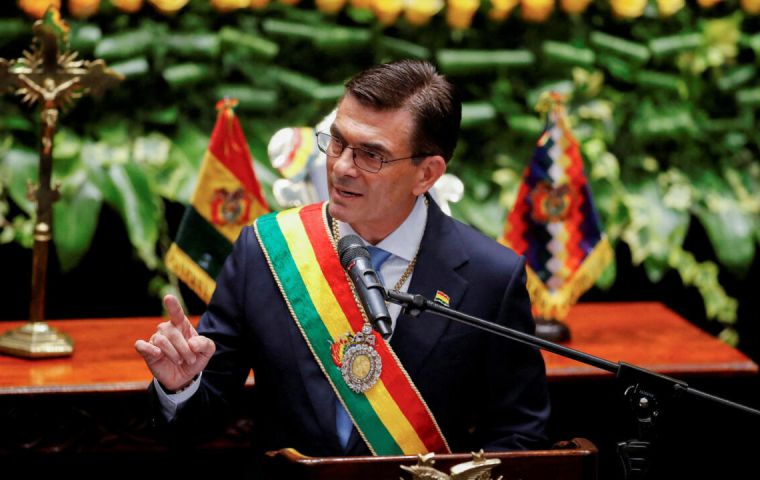MercoPress. South Atlantic News Agency
Rodrigo Paz sworn in as Bolivia's new President
 Paz's first challenge will be to solve the dollar shortage and rising prices
Paz's first challenge will be to solve the dollar shortage and rising prices Rodrigo Paz Pereira, a 58-year-old center-right politician, was inaugurated as the President of Bolivia on Saturday, assuming a five-year mandate amid a severe economic crisis. The son of former President Jaime Paz Zamora won the Oct. 19 runoff with 54.5% of the vote, successfully ending two decades of dominance by the leftwing Movement Towards Socialism (MAS).
During the swearing-in ceremony at the Plurinational Legislative Assembly, Paz took the oath alongside his Vice President, former police officer Edman Lara. Paz repeated the simple pledge that defined his victory: “God, homeland, and family, yes, I swear.”
The ceremony was attended by Presidents Javier Milei (Argentina), Daniel Noboa (Ecuador), Santiago Peña (Paraguay), Gabriel Boric Font (Chile), and Yamandú Orsi (Uruguay), as well as other key foreign dignitaries such as Brazilian Vice President Geraldo Alckmin and US Deputy Secretary of State Christopher Landau, signaling a shift in Bolivia's global outreach. The governments of Venezuela, Cuba, and Nicaragua were not invited, as Paz has vowed to strengthen ties only with nations that “respect democracy and human rights.”
Paz succeeds leftist President Luis Arce Catacora (2020-2025), marking a historic turn after the MAS's two-decade reign, which was characterized by the nationalization of the hydrocarbon sector and redistributive policies. The MAS's image had been severely damaged by a prolonged internal power struggle between Morales and Arce, leading to its defeat in the first round of the election.
The new administration immediately faces an acute economic emergency, with severe shortages of US dollars and fuel, driving up prices of food and services. This instability has led Bolivia to its first recession since 1986.
Paz was seen as a third way between the fractured socialist government and the radical liberal right. His victory was fueled by unexpected support from a broad coalition, including disillusioned indigenous communities, campesino organizations, and the Aymara bourgeoisie that emerged during the last two decades of economic growth.
His winning campaign slogan, “Popular Capitalism” or “Money for Everyone,” promises a new economic direction with pro-business measures, accessible credit, tax incentives for the formal economy, and reduced tariffs on non-domestically produced goods. Paz, a veteran politician from an influential political family, has prioritized pragmatism over ideology, stating, “Ideology does not put food on the table; what puts food on the table is the right to work and legal certainty.” However, Paz, who ran with the weakened Christian Democratic Party (PDC), will need to build strong alliances in Congress to govern effectively.
Paz's foreign policy is set to reorient Bolivia away from automatic alignments, promising to open the country “to the world” while prioritizing relations with democratic partners, strengthening ties with key neighbors like Brazil, Chile, Peru, Paraguay, and Argentina on energy and commerce.
The new administration will also have to regain credibility in forums like the Andean Community and the OAS while maintaining relationships with China and Russia but under “more transparent and balanced conditions.” The new government’s ability to resolve the dollar shortage, control rising prices, and secure a functioning Congress will be the immediate litmus test of the “Popular Capitalism” era.
One day after taking office, Paz appointed an all-male “meritocracy and efficiency” based cabinet with no representatives from the indigenous and working-class sectors: José Luis Lupo (Presidency), Fernando Aramayo (Foreign Affairs), Marco Antonio Oviedo (Government), Gabriel Espinoza (Economy), and Mauricio Medinacelli (Hydrocarbons and Energy).




Top Comments
Disclaimer & comment rulesCommenting for this story is now closed.
If you have a Facebook account, become a fan and comment on our Facebook Page!